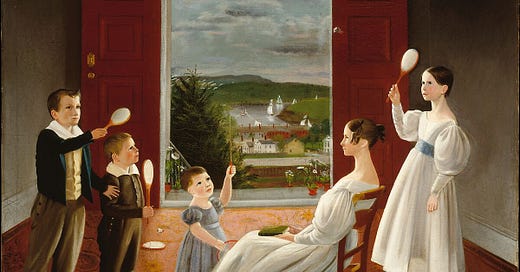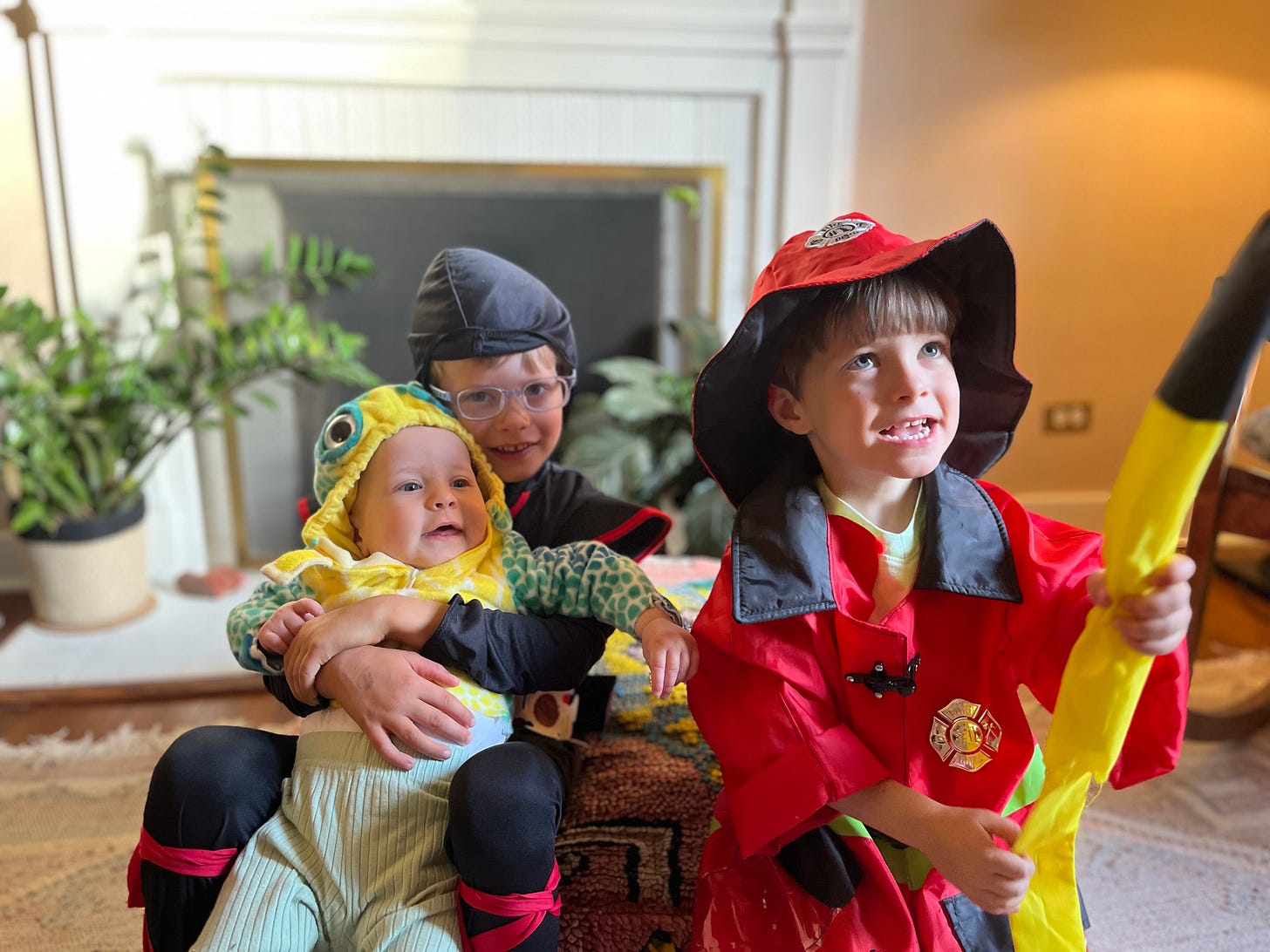I’m learning how to accept the lifelong failure that I did not have 4+ children.
I feel like I failed my mother, my destiny, my responsibility to humanity, and my body by not cranking out more babies. At the same time, I am very content with the three precious children I have, and I am not planning on having any more. I want more babies, and I definitely do not want more babies. To be a woman! It is to live, frantically, in paradoxes such as these.
But I want to still parent like I have 4+ children. Because moms of 4+ children know one thing, and it’s that they can’t take care of everyone all the time. It’s not possible. You gotta fend for yourself sometimes, all you kids, and it’s good for you to do so.
The trap of 3 kids or fewer means that you think everyone needs (and deserves) your attention constantly. There’s a lot of posturing around this, given that most people in my generation have just one or two kids. “Always being there for your kids” is a way of expressing status. Whether you’re playing right next to them on the playground and always hovering 12 inches away, or whether you’re endlessly ferrying them back and forth to extracurricular activities, you’re demonstrating that you’re extremely invested in your children and you have the luxury to be project-managing their every waking moment.
But this is not the mom of 4+. She, that increasingly rare creature, says no to so many things.
She doesn’t have time to narrate playground play. She probably isn’t even at the playground but has sent the children there on their own. She doesn’t have time for every child to have a separate enrichment activity after school. She’s focused on a few important things—like working, whether at home or outside of it; getting food on the table; housekeeping; and setting the emotional and spiritual tone of the household—but mostly, she leaves her kids alone. There’s only one of her, and there’s too many of them.
Growing up in a family with four kids, I witnessed my mother modeling this well. Every day after lunch, she’d lock herself in her room for an hour, and we were not to disturb her, upon pain of death. If we were bleeding, we could wait till the hour was up. If there was a small house fire, we’d best put it out, and do it before the hour was up. In this small but daily routine, she communicated to us that we were (1) on our own, which increased in us a sense of responsibility and independence, and that (2) her alone time was important to protect, for her good and for the good of the household.
Even though I failed humanity and only produced three children, I aspire to this form of benign neglect.
It’s good for children to learn how to be alone, to learn how to take care of themselves and their siblings.
It is good for children to not be constantly watched by an adult. The constant presence of an adult keeps children fragile.
It’s good for parents to be alone, to model independence and agency for their children.
It’s good for parents to be positioned as parents—leaders in the household, not playmates and sources of entertainment. Children’s resilience and imaginations suffer if they expect their parents to be their primary source of entertainment.
These are things I shall continue to meditate on, as I come to grips with my failure and figure out how to pretend that I had been more fertile and thus parent accordingly.
I recently endured a long-lasting bout of strep-pneumonia, and let me tell you, it’s the sickest I’ve ever been as an adult. I lost 10 pounds. I coughed myself into oblivion. My milk supply tanked. The timing was terrible; I was at my worst when both of our families were in town for Lucinda’s baptism. I stayed more or less in bed for 10 days. Even now, more than two weeks hence, I still have low energy and feel generally like I can’t walk up a hill without the need to hack up a lung.
The thing about a long(ish) illness is that you start to become convinced that this will be forever. There’s a warped experience of time when you’re sick. The days are altered; the expectation for the future is blurred. I always think of Woolf when I’m ill, and this passage in particular from On Being Ill:
“Consider how common illness is, how tremendous the spiritual change that it brings, how astonishing, when the lights of health go down, the undiscovered countries that are then disclosed, what wastes and deserts of the soul a slight attack of influenza brings to view, what precipices and lawns sprinkled with bright flowers a little rise of temperature reveals, what ancient and obdurate oaks are uprooted in us by the act of sickness, how we go down in the pit of death and feel the waters of annihilation close above our heads and wake thinking to find ourselves in the presence of the angels and the harpers when we have a tooth out and come to the surface in the dentist’s arm-chair and confuse his ‘Rinse the mouth—rinse the mouth’ with the greeting of the Deity stooping from the floor of Heaven to welcome us—when we think of this, as we are so frequently forced to think of it, it becomes strange indeed that illness has not taken its place with love and battle and jealousy among the prime themes of literature.”
When the lights of health go down! By all accounts, my illness was mild, but it was so altering to my experience of time and my body’s place in it. I’m still thinking about it and wondering what I gleaned.
Obligatory Halloween photos, from our bespectacled ninja, eager firefighter, and confused sea turtle.
Currently reading
The Safekeep, Yael van der Wouden
The Third Realm, Karl Ove Knausgaard





